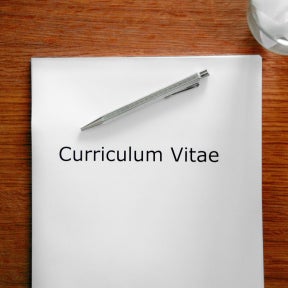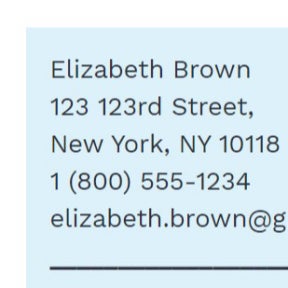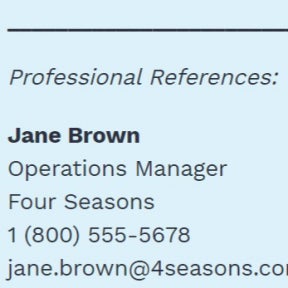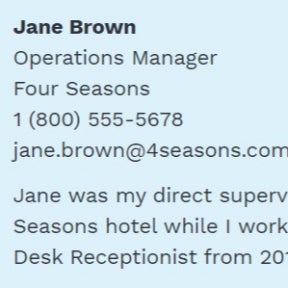How to List Your References:

A detailed guide to listing references on a resume. Includes helpful tips and examples.
Identify what is required.
Determine the number of references to include.

The number of references you include in your reference list will depend on your career level. Entry-level positions generally require about three references, while more senior positions may require five to seven references from different times in your professional history.
For the most part, prospective employers will give you guidance on how many references they will want you to include on your reference page.
The best references usually include:
- Current or former managers or supervisors.
- Current or former coworkers.
- Current or former employees or direct reports.
- Academic advisors.
- Professional mentors.
Try to choose only those references that can advocate your qualifications as they relate to the job you are applying for as well as those who you know will give you a positive reference.
Setup your reference page.
Create a separate page for your references.

In general, you should list your references on a separate, dedicated "resume references" page to be added as the very last page of your resume. However, if the job ad does not specifically request references, do not include them in your resume.
Also, do not add the phrase "references available on request." It wastes valuable space on your resume, and if the recruiter wants references, they will ask for them.
Use the same font as on your resume.

Ensure that your references page matches your resume and cover letter. Maintaining the same format, font, margins, and color schemes across your resume, cover letter, and reference page will present a professional resume package.
Start with your personal details.
Provide your personal information.

Start your reference list with your name, phone number, and email address, just as it appears on your resume and cover letter.
Add a simple line under your contact information to clearly separate it from the rest of the information on the page.
Add a title.

Below your personal information, add a title such as "references" or "professional references."
List your references.
Select your most relevant references.

Most employers, if they ask for references, will limit you to three, so you will need to carefully and wisely select the most relevant references. This should include people who can discuss your talents that are specific to the job you are applying for. Therefore, consider:
- Whether the reference works in the same industry as the one you are applying for.
- Which reference can best highlight your skills applicable to the job you are applying for.
- Which references are not suitable to give you a reference for the particular job you are applying for.
Arrange your references to your advantage.

List those references that are most likely to give you a great recommendation at the top. If you are adding references for different fields of work, you can sub-divide your references into different sections to make it easier for the recruiter to read.
Format your references.
Use the correct format.

The best way to list your references would be to use the following format:
- The reference's first and last name.
- The reference's professional title/position.
- The name of the reference's company.
- The reference's phone number.
- The reference's email address.
- The reference's relationship to you.
Do not list your reference's personal address to protect their privacy, and because hiring companies no longer contact references by mail.
Example Reference Page:
Elizabeth Brown
123 123rd Street,
New York, NY 10118
1 (800) 555-1234
elizabeth.brown@gmail.com
______________________________
Professional References:
Jane Brown
Operations Manager
Four Seasons
1 (800) 555-5678
jane.brown@4seasons.com
Jane was my direct supervisor at the Four Seasons hotel while I worked as a Front Desk Receptionist from 2017 to 2020.
John Smith
Head Waiter
The Steak House
1 (800) 555-9012
johnsmith@thesteakhouse.com
John was my colleague at The Steak House where I worked as a waiter from 2014 to 2017.
Jason Young
Assistant Manager
Wallbridge House
1 (800) 555-3456
jason.young@wbhouse.com
Jason was my supervisor at Wallbridge House while I worked as a Cleaner from 2013 to 2014.
Should You Include a Reference Section on Your Resume?
Some employers may ask you to submit references as part of your resume while others may ask for a reference list after the interview or in the final stages of the hiring process. However, offering a list of references with your resume is generally not the best policy.
If a job posting does not request references, you should not include them on your resume or with your job application. It has become more common in recent years for companies not to provide references for former employees as a way to avoid potential lawsuits, so more and more employers do not ask for them.
Also, resume experts agree that a general rule of thumb is not to add any references due to space and time issues. Generally, you will want to keep your resume as short as possible, and adding references that an employer probably won't use is wasting space that could be used for more important information.
The recruiter reading your resume also generally does not have a lot of time and will probably not reach out to your references unless you are short-listed for the job. This is usually why prospective employers do not ask for references until after the interview period.
However, in some job postings, recruiters will request references or testimonials in your resume or as part of your job application and, if so, you should follow the instructions exactly. If references are not explicitly requested here, you may be asked after your interview to submit a reference list.
Having a Master Reference List Ready:
It is helpful to have a complete "master" list of references already prepared, even if you are currently not looking for a job. This way, whenever you are asked for your references you will not struggle to come up with appropriate contacts on short notice. Gather together your professional contacts along with their names, titles, organizations, phone numbers, and email addresses and keep them handy.
If You Are Using a Master List:
If you are selecting references from a master list, remember to give them at least a two-week head's up that you are applying for a new job so that they can prepare a great reference for you.
When Listing References on a Resume:
If you are applying to a job where the job ad specifically requests your references be listed on your resume itself, you will want to add just the basics in order to save space.
The best way to format these references is as follows:
- The reference's name — their professional title and the company name.
- The reference's email address.
- The reference's phone number.
Add a heading, such as "references" or "professional references". To further save space, you can use two columns to list your references.
Example Resume References:
Example 1:
Jane Brown — Operations Manager at Four Seasons
Contact: jane.brown@4seasons.com — Phone number: 1 (800) 555-5678
Example 2:
John Smith — Front of House Manager at The Steak House
Contact: johnsmith@thesteakhouse.com — 1 (800) 555-9012
Additional Tips:
- After the hiring process, remember to thank your references for helping you in your efforts to find a new job.
- Keep a separate list of references for confidential job searches. This is useful when you want to privately search for a new job and do not want any of your colleagues or supervisors to feel uncomfortable.
- It is never too early to prepare a list of references as the more choices you have, the easier it will be to supply strong options during the hiring process. You will just need to remember to ask your references' permission when you do decide to start a job search and to give them adequate warning that they may be called to provide a reference.
- If you don't have many references, you can reach out to just about anyone you know for a character reference but it is best to avoid using family members.
- Be careful of adding someone who you have had a personal or professional conflict with as a reference. They will not be motivated to give you a good reference.
- Make sure all of your references are comfortable with being used as a reference, particularly if you are currently working with them.

